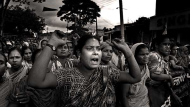WikiLeaks cables confirm concerns of IAP and partners in Bangladesh mine case
When the news broke
yesterday that a WikiLeaks cable revealed US diplomats secretly pushed the
Bangladeshi government to re-open plans for a massive coal mine, the cable
provided evidence that confirmed concerns raised since 2008 by a national
organization in Bangladesh and international human rights groups, including San
Francisco-based International Accountability Project
(http://AccountabilityProject.org):
"WikiLeaks cables prove that US officials chose to ignore the tens of thousands
of Bangladeshi people marching in the streets to oppose this mine. Behind
closed doors, they aggressively pushed for a reckless coal project that would
evict and impoverish thousands in Bangladesh-and
line the pockets of a few hedge fund managers in the U.S.," commented Joanna Levitt,
Executive Director of International Accountability Project.
The WikiLeaks cable refers to the proposed Phulbari Coal Project-a vast coal
extraction scheme that would create one of the biggest open-pit coal mines in
the world. The mine would destroy over 6,000 hectares of productive
farmland in an area that currently serves as an agricultural breadbasket for Bangladesh.
In addition, a 2008 Expert Committee Report commissioned by the Bangladeshi
government found that nearly 130,000 (129,417) people would be forcibly evicted
from their homes and lands, most of whom are indigenous and farming families
with multi-generational ties to the land.
Efforts to push this project forward have already resulted in
bloodshed. In August of 2006, paramilitary forces opened fire on
thousands of peaceful demonstrators opposing the mine, killing three people,
including a 14-year-old boy, and injuring more then 200.
The WikiLeaks cable includes comments by US Ambassador to Bangladesh, James Moriarty, that, "Asia Energy,
the company behind the Phulbari project, has sixty percent US
investment." In the cable, sent in July of 2009, Moriarty also states
that he urged the prime minister's energy advisor to authorize coal mining,
saying the "open-pit mining seemed the best way forward."
"We have seen for decades that the US Embassy works as lobby staff for
corporations-and not for the people," commented Professor Anu Mohammad of Jahangirnagar University and Secretary of a
nation-wide people's organization, the National Committee for the Protection of
Oil, Gas & Minerals (http://www.protectresourcesbd.org).
International Accountability Project (IAP) has been following the case since
2008, partnering with Professor Mohammad and others in Bangladesh to
conduct field research on the scale of forced eviction and displacement that
the mine would cause, and to pressure investors to withdraw their support for
the project-including the Asian Development Bank and Barclays.
"While US media attention on
WikiLeaks has focused on the possible threats to security," Levitt added, "we
cannot let it go unnoticed that these cables also reveal hugely problematic
entanglements between US
governance abroad and US corporate interests at home."
IAP Senior Research Fellow Kate Hoshour commented, "Let's not forget the global
warming impact. The Phulbari project would dramatically expand
coal-based energy production, the worst offender in terms of greenhouse gas
emissions and dirty energy. And it's being proposed for a country
that is among the most vulnerable in the world to the impacts of climate
change."
"If a mine like Phulbari goes ahead," said Professor Mohammad from his home in
Phulbari, "it is not just our local people here who lose when our homes and
lands are destroyed. All people lose, US people too, because
environment is a global issue-and the environmental impacts here would be
huge."
Global Coal Management Resources plc (GCM), a UK-based company, and their
wholly owned subsidiary Asia Energy Corporation (Bangladesh) Pty Limited, control
the Phulbari Coal Project, their sole asset. Nearly 40% of all GCM
shares are owned by the four companies that make up the Luxor Capital Group,
all of which are owned by Christian Leone, a US citizen who also operates a
New-York-based hedge fund in his own name

